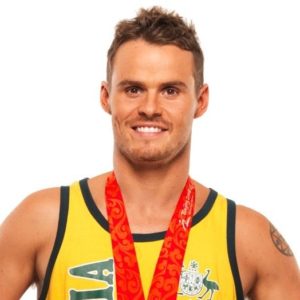Did you know that only one in four Victorians with disability actively participate in some form of sport and recreation, compared to three in four Victorians without disability?
This is an incredibly concerning statistic given that less active people have a greater risk of developing diseases like obesity, Type 2 diabetes, high blood pressure and coronary heart disease.
Physical inactivity among people with a disability has also been linked to an increase in the severity of disabilities and decreased involvement in the community.
Thankfully for Victorians, organisations like Disability Sport & Recreation (DSR) exist.
DSR’s mission is to provide and promote positive health outcomes for Victorians with disability through participation in sport and recreation. Henry Carus + Associates have been sponsoring DSR since 2014 and our support is vital to both sustain the current service and extend the program to meet demand.

Sam entered Paralympic competition with a splash when he broke the 100m Butterfly world record at the 2004 Athens Paralympic Games, his first games at the age of 16. Since then he has travelled the world claiming golds, breaking records and experiencing life at events. In 2009 Sam was awarded with the Order of Australia Medal for services to his country and for being a role model for his younger team mates.
Born without his right femur due to unknown circumstances, Sam had his right leg amputated at the age of five which enabled him to wear a prosthetic. Never letting his disability get in the way, Sam has played a number of sports including AFL football, rugby, kayaking and even captained his school water polo team.
Sam retired from swimming in 2011 due to an ongoing shoulder injury but is planning to return to Paralympic competition in the sport of Paratriathlon, just in time for the 2016 Rio Paralympics.
We asked Sam a few questions on his visit to learn more about the issues facing people with disability and the work that DSR does.
Why is there such a lack of participation in sport by Victorians with disability?
This lack of participation is because of certain barriers that people with disability face.
The three main barriers specific to sport are transport, finance and attitudinal.
Transport is a huge issue. Some people with disability are not able to drive because of their condition. It is also very expensive to participate in disability sport. A sporting adaptive wheelchair can cost upwards of $7,000 – very different from buying a pair of sneakers.
Attitudinal barriers are the hardest to work with. Some people are resistant to work with people with disability as they feel they don’t have the training or knowledge to accommodate them.
It is also common for people with disability to feel too insecure about their body to leave the house.
How do you overcome these barriers?
We break down each barrier through our programs and service provision.
We connect people with disability to accessible sporting programs around the state. This is best done by our ‘Score!’ initiative. This new interactive website makes it easier to find accessible, inclusive sport and recreation programs, linking our members to the sport or recreation program that’s right for them.
Henry Carus + Associates sponsors the Rehabilitation to Recreation Program. How is this program pivotal to your mission?
The Rehabilitation to Recreation Program introduces accessible sport and recreation activities to people with a recently acquired disability in Victorian Rehabilitation Centres.
It aims to educate therapists, case workers and allied health professionals on the positive health outcomes that sport and recreation brings for people with disability, assisting in their transition from rehabilitation settings back into the community.
What other programs do you do?
Another key program that DSR delivers is the WheelTalk School Awareness Program. The program visits thousands of students each year to raise disability awareness and promote the benefits of a healthy lifestyle.
The program encourages students to think about diversity, acceptance and disability sports, as well as give a greater understanding of the issues facing people with disability.
It is accompanied with an hour of wheelchair basketball at the end of the verbal presentation, which provides students with a physical understanding of what it is like to live with a disability.
The students are also given the chance to ask those burning questions about living life with a disability!
We have a number of other kids’ programs too. We host a summer and winter camp, which gets kids with disability out into the great outdoors and making friends through a range of recreational activities. It also reinforces social connectedness and develops skills.
Our hospital visitation programs educate young patients about what sports are out there and accessible to them. We aim to motivate them to persevere with physical activity. Each session provides an opportunity to try a different sport, conducted in partnership with the state sport organisation on site at the hospital. It is a fun and inclusive form of rehab which kids with newly acquired disabilities can participate in.
And how do you judge if these programs have been successful?
We don’t care if our members go to the Paralympics or simply do laps around the block in their sporting adaptive wheelchair.
As long as people with disability are doing something active, we know that we are ticking the box and can continue to exist as an organisation.
For more information on Disability Sport & Recreation, visit http://www.dsr.org.au
 Call Us Today
Call Us Today




